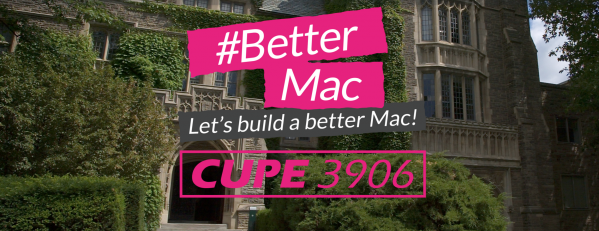McMaster University has mandated all employees to be vaccinated by September, 2021 (or undergo regular negative testing).
- By October 18th, all employees will need to be double-vaccinated. Employees with medical or religious exemptions are protected under the Ontario Human Rights Code, up to the point of “undue hardship” for employers. Employees without those medical or religious exemptions are expected to comply with the policies. For more information, please see a comprehensive guide to mandatory vaccination made by our colleagues with CUPE’s Ontario Council of Hospital Unions (OCHU).
- McMaster has released their finalized version of the policy that mandates vaccinations for students and employees: Vaccination Policy – COVID-19 Requirements for Employees and Students: https://hr.mcmaster.ca/resources/covid-19-vaccination-policy/
- Please note that the employer has a September 19th deadline for submitting an exemption request. We recommend you make the request prior to the 19th, but if for some reason you cannot, please let us know.
MEDICAL EXEMPTION
- Requires a doctor to certify that vaccination is contra-indicated. Reasonable accommodation is then required.
RELIGIOUS EXEMPTION
- If a religion or creed legitimately prevents a person from being vaccinated, they are entitled to reasonable accommodation.
PRIVACY RIGHTS
- Are not infringed in disclosing vaccination status as long as record of employee vaccination is kept confidential and info used just for this purpose
Must the employer accommodate people with a medical or religious reason not to be vaccinated?
- Yes, to the point of “undue hardship” for the employer.
What if I require an accommodation?
- In terms of the exemption process, there is a section online in McMaster’s FAQs dedicated to how to seek an exemption – this includes a link to the appropriate forms and process (see Step 4B): https://covid19.mcmaster.ca/vaccination-mandate/#tab-content-im-not-fully-vaccinated.
Can you be fired if you will not be vaccinated and do not have a medical or religious objection?
- We do not know. The law here is not certain. Arbitrators in flu vaccination cases have emphasized that the policies they upheld as reasonable did not result in discipline. This suggests that it is important for a policy to be non-disciplinary to be reasonable.
- A policy that terminates an employee for non-vaccination would be very different. There is a good argument that this type of policy would not be reasonable because it does not adequately respect the workers’ right to choose what medical treatment to undertake.
- There is, however, a risk that an arbitrator would view COVID as being so serious to the well-being of patients and staff that it would justify this type of policy.
- Members in workplaces with policies that threaten termination should understand that, if they refuse to become vaccinated, the employer might terminate them.
- If this happens, and if the union grieves the termination, it cannot guarantee a particular outcome.
Consequences of choosing not to be vaccinated without a medical or religious exemption
- McMaster’s COVID vaccination policy must be assessed individually to determine if it is reasonable. However, arbitrators have upheld influenza vaccinepolicies that have placed unvaccinated workers on modified job duties that reduce their interactions with patients or other workers, as well as policies that place unvaccinated workers on unpaid leaves of absence for the duration of outbreaks.
- It is important to recognize that the COVID pandemic is not just another flu season. Arbitrators will view COVID as being more serious and may be willing to accept even more significant consequences for workers as “reasonable”.
- For example, in flu vaccine cases, unpaid leaves of absence tended to last only for a relatively short period of time (i.e. until a flu outbreak in the workplace resolved).
- In the context of the COVID pandemic, arbitrators may accept that even if there is no outbreak in the workplace, workers may be placed on unpaid leaves of absence. Those leaves of absence may be for long periods of time, as there is no clear “end” in sight to the COVID pandemic.
Where can I find more information?
- If you have questions about being vaccinated against COVID-19, our national union has developed the following helpful FAQ: https://cupe.ca/sites/cupe/files/faq_vaccines_covid19_en_0.pdf
- If you are not satisfied with the employer’s decision regarding your request for an exemption or accommodation, please let us know and we can discuss options with you. The legal landscape is rapidly evolving, but we would like to direct your attention to this page from CUPE: https://cupe.ca/covid-19-vaccination-workers-rights
- You can also access COVID-19 Resources Canada (covid19resources.ca) for various COVID vaccination questions and answers. It is staffed by Volunteer Doctors, Nurses, Pharmacists, etc., who answer any and all types of questions about the scientific/medical aspect of vaccinations.
What is CUPE’s opinion?
- We believe that the benefits of vaccines clearly outweigh any adverse event risks.
- CUPE’s Health and Safety Branch strongly recommends vaccination to our members in consultation with their own medical providers or a practitioner reached through a provincial health care line.
- We will continue to support the benefits of vaccination until such time as the World Health Organization (WHO), the Center for Disease Control (CDC) or the Public Health Agency of Canada (PHAC) changes their vaccine guidance.
- CUPE’s Health and Safety Branch has previously released vaccine guidance related to the balancing of CUPE members’ individual rights, health and safety, the recognition of public health information and the interest of the community.
I still have questions….
Please contact your CUPE Local 3906 representatives – either by emailing staff@cupe3906.org, healthandsafety@cupe3906.org or president@cupe3906.org
A PDF version of this page can be accessed here.
